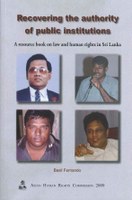 The Asian Human Rights Commission wishes to inform you about its new publication ‘Recovering the authority of public institutions’.
The Asian Human Rights Commission wishes to inform you about its new publication ‘Recovering the authority of public institutions’.
The book consists of two parts. In the first there is a study on the drift of Sri Lanka from a rule of law system to a non-rule of law system. It studies the loss of the supremacy of the law where the paradigm shift from a system recognising the separation of powers, having drafted in a such a way in order to bring the military in as the arbiter on national issues. This has involved changes in law, changes of investigations into crimes and human rights abuses, the loss of the binding character of the law, the loss of the prestige of the constitution as the paramount law and the loss of respect for treaty obligations. The weakening of the investigative mechanisms, the undermining of the prosecutorial system of the Attorney General’s Department and impunity eating away at fair trial and the judiciary. The next change is a point by point review of the government actions (inactions) regarding the recommendations made by several UN agencies. It is followed by a chapter on five overlapping conflicts and their implications on the Sri Lankan legal system. A detailed study of the issue of torture and the failures in prevention is studied together with a praxis perspective on subverted justice and the breakdown of the law in the country. The problem of police reform initiatives within a dysfunctional system is studied in a separate chapter.
The second part of the book consists of the study of 200 complaints about torture out of about a 1000 researched for the purpose of this book. The overall conclusion is summed up in the back page of the book thus:
This book makes a shocking revelation. It confirms that all those who suffer human rights abuses face the same fate that the assassinated journalist, Lasantha Wickramatunga, predicted for himself in addressing the President of Sri Lanka. “In the wake of my death I know you will make all the usual sanctimonious noises and call upon the police to hold a swift and thorough inquiry. But like all the inquiries you have ordered in the past, nothing will come of this one, too.”
This book is the product of nearly 15 years of work of many persons. Literally, thousands of persons were interviewed and hundreds of cases were pursued over the course of several years. This journey took us to magistrate’s courts, high courts, the Court of Appeals, the Supreme Court and on some occasions, the United Nations Human Rights Committee. On all these occasions we had the opportunity to observe how the government of Sri Lanka and its agencies acted in the face of the serious complaints raised in these cases. The basis of this book is the detailed records of these cases.
Two hundred cases of police torture, mostly from the South, have been summarised here. During most of this period, parts of the North and East were not under the control of the government of Sri Lankan. However, these cases are from the areas under government control and from places far away from the conflict. Therefore, they speak of a far greater crisis of the Sri Lankan political and legal system than the ethnic conflict.
For many years the AHRC has commented on the crisis of the rule of law system in Sri Lankan and these views have been shared with a large audience for a considerable time. The analysis of the problem has found the agreement of almost everyone, except those who are professionally obliged to deny that human rights violations exist in the country. No part of this book can be said to be an exaggeration. Perhaps on the other hand, it may be justified to say that these revelations are, in fact, an understatement of the actual situation.
The book will be available at bookshops or may be obtained through the Asian Human Rights Commission, Hong Kong.
Published in 2009 by the Asian Human Rights Commission, 545 pages, Language: English, ISBN 978-962-8314-44-7, PID: AHRC-PUB-002-2009
For orders and enquiries: Email ahrc@ahrc.asia or call +(852) 2698 6339 +(852) 2698 6339.
Click here to download this publication in PDF format.